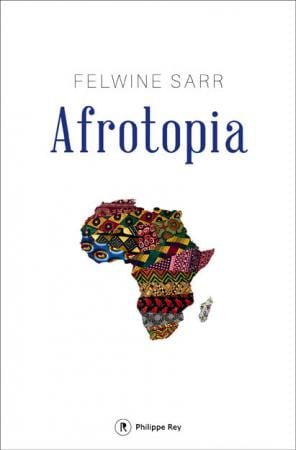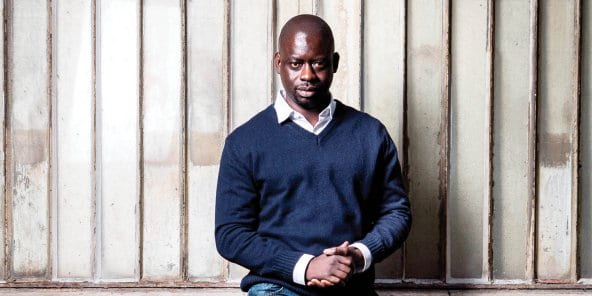by guest contributor Laetitia Citroen
2016 has been a particularly prolific year for the French-speaking African intellectual community, with symbolical landmarks like the appointment of a Congolese award-winning novelist, Alain Mabanckou, as guest-lecturer at the prestigious Collège de France in Paris and the gathering of some of the best minds of the continent (many of whom teach in the US) in two international and interdisciplinary conferences—one at the Collège de France, and one at the Universities of Dakar and Saint Louis in Senegal—to think about the future of Africa in terms of its economy, philosophy, and culture.
 The organizer of the Conference in Senegal, Felwine Sarr, is a young economist and philosopher whose most recent book could serve as a manifesto for this new dynamic. Afrotopia powerfully advocates for a new Africa. Sarr combines work as an economist with a broad philosophical background in both European and African traditions. This essay is punctuated with deft quotations from Castoriadis, Lyotard, and Foucault alongside Mudimbé, Wiredu, and Mbembe, all as Saar discretely takes up the heritage of Frantz Fanon. In spite of the title, the author’s purpose has nothing of the dreamy or the unrealistic. Afrotopia is not an u-topia, a place that does not exist; rather, it is a topos, a place that can and will appear because “there is a continuity between the real and the possible.” This book is not an optimistic dream; it is a galvanizing declaration of love to an entire continent that has so much potential and only needs to become aware of it. It is also a deeply philosophical analysis of the numerous invisible ties that prevent its economies from ‘growing’ and ‘developing.’
The organizer of the Conference in Senegal, Felwine Sarr, is a young economist and philosopher whose most recent book could serve as a manifesto for this new dynamic. Afrotopia powerfully advocates for a new Africa. Sarr combines work as an economist with a broad philosophical background in both European and African traditions. This essay is punctuated with deft quotations from Castoriadis, Lyotard, and Foucault alongside Mudimbé, Wiredu, and Mbembe, all as Saar discretely takes up the heritage of Frantz Fanon. In spite of the title, the author’s purpose has nothing of the dreamy or the unrealistic. Afrotopia is not an u-topia, a place that does not exist; rather, it is a topos, a place that can and will appear because “there is a continuity between the real and the possible.” This book is not an optimistic dream; it is a galvanizing declaration of love to an entire continent that has so much potential and only needs to become aware of it. It is also a deeply philosophical analysis of the numerous invisible ties that prevent its economies from ‘growing’ and ‘developing.’
The book also treats the ‘economy’ of Africa in the most philosophical sense: the complex network of relationships that connects African people on all kinds of levels, a study of what constitutes the inner equilibrium of the continent. Despite Sarr’s training as an economist, you will find not find here any graphs or compilation of numbers imported from World Bank Reports. Instead, he dwells on the importance of sustaining the link between culture and economy: “in human communities,” he writes, “the imaginary is a constitutive part of social relationships, including the most materialistic ones. An economic interaction is, first and foremost, a social interaction. The imaginary and the symbolical determine its production. Therefore, cultural factors will influence economic performances. (…) African economies would take off if only they functioned on their own motives.” Quoting French intellectual Cornelius Castoriadis, Sarr argues that the first step is an “imaginary institution” of this new Africa, of this “Afrotopia.” African intellectuals need to take the time to define their own “autonomous and endogenous teleonomy”: to set the goals of the African societies themselves or, to put it in other terms, to block any external attempt to determine what would be good for Africa. In many ways, the term ‘development’ itself needs to be decolonized.
The author hence argues that not only have International Aid Agencies forgotten to take specific cultural features into account, but that they have also brought their own teleology. Real African ‘development’ cannot and will not take place if it only aims at objectives—like ‘growth’—that Westerners consider best. He quotes his friend the Togolese novelist Sami Tchak, who once provocatively asked him: “When will we ever stop considering others’ past as our future?” Afrotopia is precisely an African place, not a copy of the global north. When reflecting on other ways of defining ‘development,’ Sarr refers to the philosophy of development as Amartya Sen and Martha Nussbaum founded it; he also underlines the symbolical value of all economic exchanges as studied by anthropologists of economy—like Jane Guyer—who show how all economic behavior is based on cultural meaning. Simple examples of this could be the money sent home by emigrants of the diaspora or the importance of hospitality.
Therefore, writing about the African economy entails much more than drawing graphs. The pure rationality of an homo economicus yields no satisfactory explanation of economic exchanges in Africa—or, the author hints, anywhere else. So studying the economy of Africa proves nothing short of studying the social interactions themselves; Afrotopia must be a place that thrives ‘economically’ in its fullest meaning ; it has to be a place that “makes sense to those who inhabit it.” Understanding this requires taking distance from, or completely abandoning, the “methodological individualism” of orthodox economic thinking. Therefore, Sarr calls for an “epistemic decentering,” even for an “epistemogonia.” Western economics yield an épistêmè of sorts that need to be reconsidered before being applied to African situations as other non-Western economists, like Ugandan Yash Tandon or Indian Rajeev Bhargav have pointed out. Africa needs to speak about itself in its own language, and it is time to “leave the dialectic of appropriation and alienation behind.” Africa is not faced with a binary choice of either being alienated, of losing its identity to the hands of new colonizers, or of willingly embracing the Western civilization.
But this carries wider implications than simple methodology: the debate about Africa is stuck in a dialectic of tradition and modernity. The lack of ‘modernity’ in Africa commonly refers to the lack of technological and industrial ‘progress.’ Yet why do we still speak in these terms about Africa when philosophers in the West have long started theorizing postmodernity? Sarr situates his Afrotopia as part of this new way of thinking: simple mimetism of Western values is no real ‘progress’ for Africa; and the ‘weight’ of ‘tradition’ is no synonym of backwardness and refusal to change. Rather, it is also the unique root from which the continent can draw its future, as Japan did one hundred and fifty years ago. In the end, Sarr advocates for an “Afrocontemporanéité” rather than an African modernity: equally averting from nostalgia of a mythical past and from pure awe at technological progress, Sarr argues that Africa has to consider its situation as it is right now, in its contemporaneity, and make sure it is as unique and true to itself as it can be.
There is no fatality. Africa is not this tragic continent that has lost all connection with its ancient culture, nor is it this strange space that will eventually come to resemble northern countries. The author calls pragmatically for thinkers who will take Africa as it is right now, with the inherited and the assimilated. As can be seen in the beautiful creations of young African stylists (Sarr takes his examples in all realms of activity, from fashion to urbanism), whose syncretism can be a virtue: “we are the result of what has persisted, the result of the syntheses that took place in ourselves.” In a way, Sarr also foresees Africa’s capacity to jump directly into the twenty-first century without endlessly asking itself about its past – be it colonial or pre-colonial – and invites us to trust its capacity of poiésis, of creating something new. For instance, the continent has not yet built environmentally harmful industries on its soil, and could therefore start implementing cleaner ways of production right from the beginning, and even use its resources as leverage to impose these clean industries in the rest of the world.
So where is this Afrotopia, and how can we find it—the real place of Africa, the one it has not yet been able to bring into shape? The must first exist as a mental place; it needs to be built in ideas, intention, and will before it is built on real land. As with any proper construction work, however, the foundation must be clean, and the tendency to uncritical imitation must be set aside. This is, indeed, a very classical idea in the postcolonial context look back to Fanon’s Black skin, white masks (1952). Africans should stop running away from their true selves. For Sarr, economy (and therefore civilization) is not about comparing childishly who has the more riches; it is about building societies that pursue their own happiness, defined according to their own values.
One thing that could have been interesting in addition to this powerful global analysis may have been an inquiry into the unity or diversity of ‘Africa.’ The author brings up intellectual and political references from all over the continent – from South Africa’s Nelson Mandela to Ghana’s Kwame Nkrumah, from Burkina Faso’s Thomas Sankara to Tanzania’s Julius Nyerere—and we would want to know more about his vision of “the continent” as a whole. What constitutes its unity? The question, of course, can be asked about any continent, and Sarr rightly complains that Africa has been asked that question many more times than others. But for a continent that is far too often considered as a massive entity, sometimes even confused with a ‘country,’ it would be extremely enlightening to have his contribution to a question that will likely never be fully answered.
In the end, what the author pleas for is time—it is the “longue durée” (long-term) defined by French historian Fernand Braudel as the time allowing civilizations to build themselves cautiously, carefully and wisely and the time necessary to structure strong and autonomous values one by one. It also marks the time that is needed to ‘imagine’ this new Africa, the time needed for intellectuals to conceptualize this Africa yet to come. It is the time needed for governments to plan in the long run, and not be forced to make rash decisions when selling their precious resources because the needs are too urgent. But the advent of Afrotopia is near at hand: it is like the blueprint of an entirely new continent, and this book sounds like the guideline for a whole generation of philosophers, economists, historians, architects, musicians, artists who will transform the current Africa into this “Afrotopia, this other Africa which we should hurry to make real, because it realizes its happiest potentialities.”
Laetitia Citroen studied philosophy at the Ecole Normale Supérieure in Paris and is a PhD candidate in political philosophy at the University of Lyon (France). Her dissertation examines the philosophical background necessary to rethinking economic development in West Africa, namely through taxation, in a less abstract and more humanist way.





1 Pingback